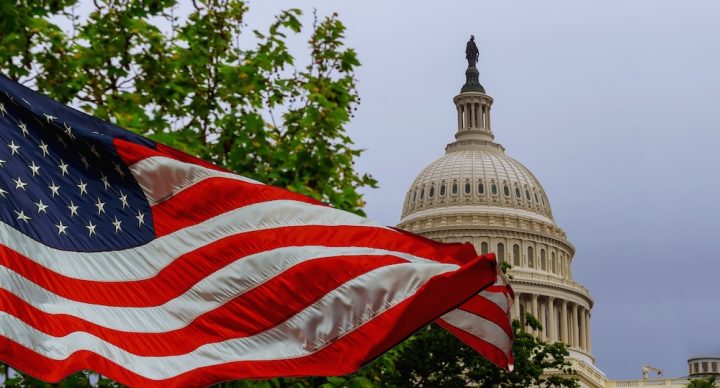AP United States Government & Politics

Course Features
Course Details
Course Overview
In Acellus AP United States Government & Politics, students explore the foundational principles, structures, and processes of the United States government, gaining a comprehensive understanding of how democratic ideals shape political institutions and decision-making. They delve into historical documents, key compromises during the nation's founding, and the evolution of federalism, separation of powers, and checks and balances, while analyzing landmark Supreme Court cases and debates between Federalists and Anti-Federalists. Through this, learners develop critical thinking skills to evaluate how these elements influence contemporary governance, policy implementation, and the balance between national and state powers.
The course also covers civil liberties and rights, political ideologies, participation methods, and the role of media, parties, and interest groups in shaping public opinion and elections. Students examine social movements, voting behaviors, campaign dynamics, and the impact of globalization and technology on politics, preparing them to assess ideological shifts and policy debates. Ultimately, the curriculum equips students with the knowledge to navigate complex political landscapes, interpret data from polls and elections, and apply constitutional principles to real-world scenarios, culminating in exam preparation strategies for success.
 This course was developed by the International Academy of Science.
Learn More
This course was developed by the International Academy of Science.
Learn More
Sample Lesson - Introduction
Scope and Sequence
Unit 1: Foundations of American Democracy Students will learn the core democratic ideals such as natural rights, social contract theory, popular sovereignty, limited government, separation of powers, checks and balances, federalism, and republicanism. They will examine historical documents like the Declaration of Independence, Federalist Papers, Brutus No. 1, and the Articles of Confederation, along with key compromises in the U.S. Constitution, including the Great Compromise, Electoral College, Three-Fifths Compromise, and the amendment process. The unit covers the evolution of government power, individual rights, and interpretations of clauses like due process, equal protection, commerce, necessary and proper, supremacy, and the 10th Amendment, fostering an understanding of how these foundations distribute power and address societal impacts.
Unit 2: Interactions Among Government Branches Students will explore the structures, powers, and interactions of Congress, the presidency, the judiciary, and the federal bureaucracy. They will study enumerated and implied powers, legislative processes, congressional behavior, presidential formal and informal roles, checks on executive power, judicial review through cases like Marbury v. Madison and McCulloch v. Maryland, and bureaucratic accountability. The unit emphasizes how these branches influence policy, with discussions on republicanism, spending types, media communication, and oversight mechanisms, providing insight into the dynamic balance of power in government operations.
Unit 3: Civil Liberties and Civil Rights Students will examine the Bill of Rights, selective incorporation via the 14th Amendment, and protections for freedoms of religion, speech, press, assembly, and the right to bear arms, analyzed through landmark cases such as Engel v. Vitale, Wisconsin v. Yoder, Tinker v. Des Moines, Schenck v. United States, New York Times v. United States, and McDonald v. Chicago. They will learn about due process, privacy rights, equal protection, social movements, affirmative action, and government responses to civil rights issues, including cases like Brown v. Board of Education, Gideon v. Wainwright, and Regents of the University of California v. Bakke, balancing individual liberties with public order and minority-majority rights.
Unit 4: American Political Ideologies and Beliefs Students will investigate major political ideologies, attitudes toward government, political socialization, and ideological shifts influenced by events and globalization, drawing from works by Thomas Friedman, Robert Putnam, and Cathy J. Cohen. They will learn polling methods, public opinion evaluation, partisan platforms of Democrats, Republicans, and independents, and how ideologies shape policy on issues like citizen participation, liberty versus stability, economic regulation, social privacy, and acts such as the DREAM Act and Personal Responsibility and Work Opportunity Act, including cases like Planned Parenthood v. Casey and Zelman v. Simmons-Harris.
Unit 5: Political Participation Students will study voting rights expansions through amendments, voter turnout factors, behaviors, and influences on choice, alongside the roles of political parties, interest groups, and media as linkage institutions. They will explore party functions, adaptations, third-party impacts, campaign finance, PACs, and cases like Citizens United v. FEC, as well as election processes including primaries, caucuses, conventions, the Electoral College, incumbency advantages, and modern campaign elements like social media and fundraising, with historical case studies from elections in 1992, 2000, 2012, and 2016.
Unit 6: Preparing for the AP Exam Students will review the AP exam structure, assessed skills, multiple-choice and free-response question formats, required Supreme Court cases, and strategies for writing FRQs, understanding scoring rubrics, and selecting review materials. The unit emphasizes comprehensive preparation techniques to synthesize course content, analyze political scenarios, and apply knowledge effectively for exam success.
Following this unit, students are presented with the Final Review and Exam.





